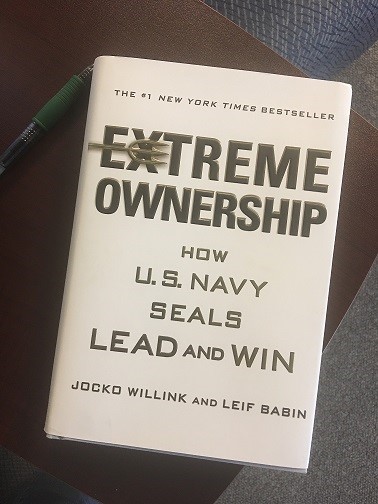Every quarter at NuWaves, our team joins the President for discussion of a book that intends to help improve the company. We are currently on book #38, which revolves around the topic of ownership; we read books on various topics including leadership development, business challenges, teamwork, and organizational culture. Every now and then, we read a book that rings true for the culture we strive to create at NuWaves – a One Team culture of dedicated people, processes, and accountability.
 NuWaves strives to create a culture based on the principles of extreme ownership to improve teamwork, accountability, and leadership at all levels
NuWaves strives to create a culture based on the principles of extreme ownership to improve teamwork, accountability, and leadership at all levels
The last book we read was ‘Extreme Ownership’, by former Navy SEALs Jocko Willink and Leif Babin. While the military theme of the book was certainly enjoyed by our patriotic group, the messages of true ownership are what really hit home with our teammates. This is a must-read for anyone desiring to improve their leadership or improve accountability and teamwork. Based on our experience as leaders and growing a business, some key takeaways to support an ‘ownership’ mindset in the culture are described below.
1. No Ego: Not only were there several examples throughout the book that described how detrimental ego can be to teamwork and accountability, but we see it in business every day. Watching out for defensiveness, blaming, and excessive pride can keep the ego in check and allow all members to better serve the team.
2. Take Ownership, No Excuses: All employees are responsible for taking ownership of their situation and getting what they need from their teammates and their leaders to lead the team to success. If a situation needs improving, take action to improve it by seeking clarity, communicating, working as a team, and letting go of egos.
3. Leaders Have Ultimate Responsibility: If you are the leader, and something goes wrong, it is ultimately on you. No excuses. It is your job to communicate and make sure your team has the proper situational awareness to make good decisions. It’s your job to build a strong team and remove non-performers. It is your job to prioritize and set clear goals.
4. Communicate, Communicate, Communicate: Everyone on the team has the responsibility to communicate effectively. Leaders need to provide situational awareness. Everyone on the team has the responsibility to ask questions and seek clarity so they can make good decisions.
5. Prioritize: We have so many initiatives we want to tackle as a company that it can sometimes be overwhelming. It is important to step back, and set clear priorities, plans, and timelines so we can make real progress instead of tackling everything at once.
Overall, this was an excellent read that allowed us to make positive changes in the way we work as a team. We are looking forward to our next read, “The Ideal Team Player”, by Patrick Lencioni.
Interested in joining a great team focused on continuous improvement and accountability? Check out our open positions!


